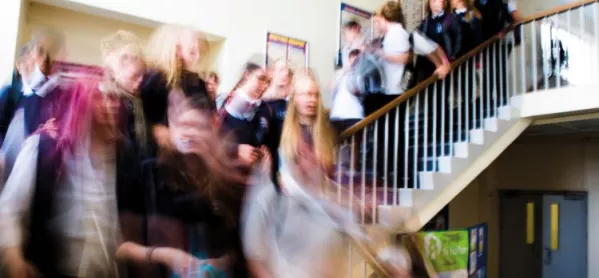Ofsted will be cracking down on poor pupil behaviour by asking lunchtime supervisors what is really going on in schools, the chief inspector is expected to say today.
Amanda Spielman will tell delegates at an education conference that pupil behaviour is the number one concern that parents raise with Ofsted – and it creates low morale among teachers.
A new judgement on pupil behaviour is expected to be introduced.
And Ms Spielman will add that she is committed to addressing the rumours that badly behaved children are “hidden” from inspectors, “perhaps on conveniently timed school trips”.
But her comments have received short shrift from heads' leaders, who have cast doubt on whether such tactics are really used.
“There are obvious limitations to what we’re able to observe about behaviour in a single day. But we are looking to overcome them,” Ms Spielman is expected to say at the Wellington College Festival of Education.
“There is scope for more dialogue with a wider range of staff, such as trainees, NQTs and lunchtime supervisors, who are more likely to be exposed to poor behaviour.”
She is due to add that sanctions for poor behaviour, such as litter picking, writing lines and detentions, will have Ofsted’s full support.
A 'separate' behaviour judgement
And she is expected to back bans on mobile phones – something that culture secretary Matt Hancock called for yesterday.
“I want to see behaviour get the attention it deserves in our inspections, probably through a separate behaviour and attitudes judgement,” Ms Spielman is expected say.
“I fundamentally disagree with those who say that taking a tough stance on behaviour is unfair to children. Quite the opposite, there is nothing kind about letting a few pupils spoil school for everyone else.
"That is why we expect heads to put in place strong policies that support their staff in tackling poor behaviour. And I think it’s entirely appropriate to use sanctions, such as writing lines, ‘community service’ in the school grounds – such as picking up litter – and school detentions.
"And where they are part of a school’s behaviour policy, they’ll have our full support. There’s no doubt that technology has made the challenge of low-level disruption even worse, which is why I also support recent calls to back heads who have decided that the way to improve behaviour is to ban mobile phones in their schools.
"I’m not the target audience, but nevertheless I am yet to be convinced of the educational benefits of all-day access to Snapchat and the like; and the place of mobile phones in the classroom seems to me dubious at best.”
The idea of Ofsted inspectors talking to a wider range of staff about pupil behaviour was a recommendation in the review of behaviour in schools carried out by Tom Bennett last year.
“I want to address, once and for all, the constant rumours we hear about badly behaved children being hidden from inspectors, perhaps on conveniently timed school trips. My research and analysis teams are currently designing a study to assess the extent of the problem, and what we might do about it,” Ms Spielman will say.
She is expected to add that an advisory panel of heads and teachers who have successfully eliminated poor behaviour is being set up.
Nick Brook, deputy general secretary of the NAHT, said: “Schools get less than a day’s notice of inspection, so it is extremely unlikely that a school trip for a group of unruly pupils could be organised in that time in order for the school to avoid their behaviour being scrutinised.
“Holding schools to account for the work that they do is an essential part of our publicly funded education system, but the National Audit Office recently concluded that Ofsted cannot show whether its school inspections are having a positive impact on standards.
"This should be Ofsted’s focus for the coming 12 months, not rumour-driven investigations which could further erode public confidence.”





